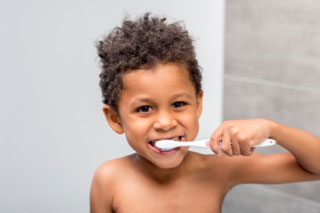 Oral health is an essential part of overall health in both children and adults. The sooner children are exposed to healthy habits regarding their teeth, the better their chances are of having healthy teeth as adults. Your job as a parent is to ensure that your children have the best oral and physical care.
Oral health is an essential part of overall health in both children and adults. The sooner children are exposed to healthy habits regarding their teeth, the better their chances are of having healthy teeth as adults. Your job as a parent is to ensure that your children have the best oral and physical care.
Children don't understand how to take care of their teeth and need their parents to lead by example. Part of your job as a parent is to help your kids brush their teeth, teach them how to floss effectively, and help them understand how to maintain good oral health.
However, you may be inadvertently contributing to your children's poor oral health. You can fix this, however, and make the most of your kids' oral health practices at home. Learn the oral health issues you may be encountering at home with your kids, and with your dentist's help, how you can repair them.
Not Brushing Twice Daily
Parents may think that brushing once a day in the morning or night, and while it's better than not brushing teeth at all, it's not ideal. Children need to brush twice a day, especially before bed. When children don't, they are at a higher risk of getting cavities, gum disease, and bad breath.
As a parent, you can help encourage your child to brush twice daily by setting a good example. Let your child see you brush your teeth twice daily. Also, make brushing a fun activity by singing or playing a favorite song or playing a game while brushing to encourage longer teeth brushing at a time. The ADA recommends that people of all ages brush their teeth for two minutes at a time. Brushing for two minutes can be more of a struggle for kids, but making the activity entertaining can make it less of a chore.
Not Flossing
As an adult, you floss regularly to protect your teeth and gums and to clean your gums. Kids are no exception, but they often don't floss as much as their parents do. Most parents struggle to get their kids to floss at all. Flossing helps remove food particles and plaque from between the teeth of your kids, which is especially helpful because most kids struggle to brush their teeth in the first place properly.
Children should start flossing once they have two teeth that touch each other, so if your kids have more than a few teeth, start making flossing a habit at home. Encourage flossing with your kids and make it a fun game, even if you're flossing in the middle of the day while watching a television show.
Not Using Fluoride Toothpaste
Fluoride is a mineral that helps strengthen teeth and prevent dental decay. Fluoride is present in most toothpaste and city drinking water. However, some parents may avoid using fluoride toothpaste because they fear their child may ingest too much of it.
The American Dental Association (ADA) recommends using fluoride toothpaste for children above two years old. If you're worried about the use of fluoride in your home and have been using alternatives to brush your children's teeth, reconsider its use and speak to your pediatric dentist — especially if your children have been getting cavities or your dentist is worried about cavities.
Consuming Sugary Beverages and Snacks
Sugary drinks and snacks can cause bacteria in the mouth to produce acid, which can erode the teeth' enamel, leading to cavities. Kids can be especially prone to the effects of sugary things because they consume candy, juice, and sodas more frequently than adults do and they don't brush their teeth and swish their mouths with water after.
As a parent, you can limit your children's sugar intake by offering healthier snacks such as fruits or vegetables. Also, encourage your child to drink water instead of sugary drinks or alternate between the two.
Skipping Dental Check-Ups
The American Academy of Pediatrics recommends children visit a dentist around the age of one or until teeth start to emerge. After that, children should see a dentist every six months, even if they have no oral health issues that seem apparent. Skipping dental check-ups can lead to dental problems that may require costly and complicated treatments. Be sure to schedule appointments with your child's dentist and follow their recommendations.
Parents play a crucial role in their children's oral health. By following the tips in this blog post, you can improve your child's oral health practices at home and reduce their risk of getting cavities, gum disease, and bad breath.
Remember to brush twice daily, floss, use fluoride toothpaste, limit sugary snacks and drinks, and schedule regular dental check-ups. By doing these simple things, you can help your child maintain good oral hygiene and set them up for a healthy smile for life. Schedule dental checkups for your kids with Dentistry for Children & Adolescents today.